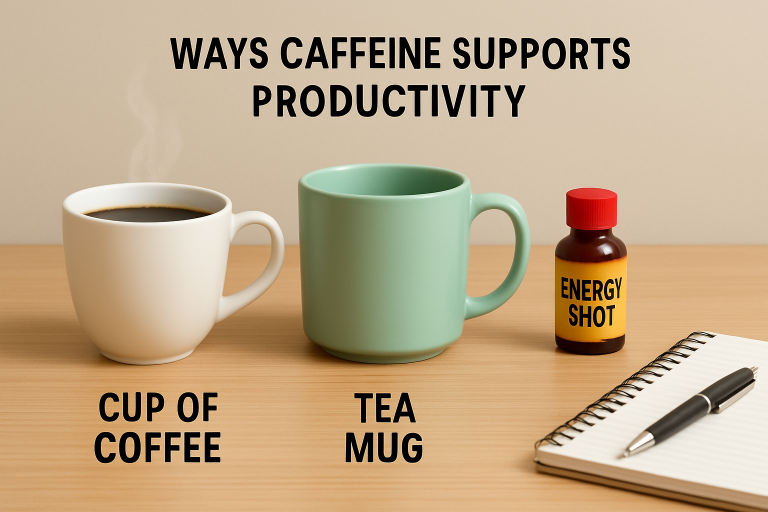Categories more
- Adventures (16)
- Arts / Collectables (15)
- Automotive (37)
- Aviation (11)
- Bath, Body, & Health (76)
- Children (6)
- Cigars / Spirits (32)
- Cuisine (16)
- Design/Architecture (21)
- Electronics (12)
- Entertainment (4)
- Event Planning (5)
- Fashion (44)
- Finance (9)
- Gifts / Misc (6)
- Home Decor (44)
- Jewelry (40)
- Pets (3)
- Philanthropy (1)
- Real Estate (14)
- Services (22)
- Sports / Golf (14)
- Vacation / Travel (60)
- Watches / Pens (14)
- Wines / Vines (24)
- Yachting / Boating (16)
How Caffeine Fuels Productivity: Debunking Myths and Sharing Smart Consumption Tips
Published
08/24/2025Key Takeaways
- Caffeine can boost alertness, memory, and mental performance when used thoughtfully.
- Common myths about caffeine and its effects are often exaggerated or misinterpreted.
- Smart strategies can help maximize the benefits of caffeine without negative side effects.
- Hydration, timing, and dosage play crucial roles in a healthy approach to caffeine.
The Role of Caffeine in Mental Performance
In today’s fast-paced world, caffeine has cemented itself as a staple for enhancing focus and staying productive. Whether it’s the ritualistic morning coffee or a convenient energy shot before a project deadline, many rely on caffeine to keep their minds sharp. In particular, energy supplements such as 5-hour energy have become popular for delivering a quick and measured boost without the hassle of brewing coffee. Research shows that caffeine increases alertness, improves concentration, and boosts mood, making it beneficial for students, professionals, and those looking to beat the afternoon slump. However, individual differences, such as metabolism, tolerance, and overall health, determine the effectiveness of caffeine's effects. The key is understanding one's body's response to different forms of caffeine. Caffeine's effects are cumulative when paired with other positive habits like sleep, nutrition, and physical activity. Timing and dosage are crucial for optimal use. The rise of energy drinks and shots is redefining caffeinated productivity.
Dispelling Common Caffeine Myths
Caffeine is often misunderstood, with myths such as it being dangerously addictive or harming heart health. However, reputable sources like the CDC state moderate use is safe, and research shows it doesn't increase cardiovascular risk in healthy adults. The belief that caffeine always ruins sleep is also false; when consumed earlier, it usually doesn't impair sleep, as timing, genetics, and lifestyle play bigger roles. Understanding these factors helps users avoid false perceptions of moderate caffeine use.

Brain Benefits Supported by Research
A growing body of research confirms that caffeine, used wisely, offers tangible brain benefits. Studies from respected medical organizations show caffeine can enhance certain memories—especially when consumed soon after learning. The NIH states caffeine after a learning session improves recall. Regular, moderate caffeine intake is also linked to a lower risk of neurodegenerative diseases like Alzheimer’s and Parkinson’s, promising for long-term cognitive health. The Alzheimer’s Society provides an overview here. However, caffeine’s benefits do not replace healthy living. Sleep, exercise, and balanced meals are essential, with caffeine serving as a helpful routine supplement.
How Much Caffeine Is Too Much?
The U.S. FDA advises healthy adults to consume up to 400 mg of caffeine daily, equivalent to four cups of coffee, to avoid negative side effects. For pregnant, breastfeeding, young, or sensitive individuals, a lower daily intake is recommended. Monitoring caffeine intake requires mindfulness, as it can be found in various products, ensuring stable energy levels and preventing overconsumption.
Scheduling Your Caffeine Boosts
Caffeine works best when it complements your natural energy rhythms instead of overriding them. Most people experience an energy dip in the late morning or mid-afternoon, making these times ideal for a targeted caffeine boost. Avoid consuming caffeine within six hours of your planned bedtime to prevent sleep disruption. Structuring caffeine around key work periods or study sessions, rather than drinking continuously throughout the day, helps maximize focus when you need it most—without risking dependency or insomnia.
Hydration and Other Healthy Habits
Contrary to another common myth, moderate caffeine intake rarely causes dehydration. However, maintaining adequate hydration by drinking water throughout the day is key to optimal concentration and energy. Rounding out your productive routine with healthy habits—such as eating nutrient-rich meals, engaging in regular movement, and taking breaks—ensures that caffeine supports rather than replaces wellness fundamentals.
It’s also wise to check the sugar content of your caffeinated products, especially energy drinks or specialty coffees. High sugar intake can spike energy temporarily but leads to later crashes, undercutting the productivity benefits you’re seeking.
Alternatives to Caffeine for Energy
Caffeine is just one tool in the productivity arsenal. Alternatives like short naps, brisk walks, and deep breathing exercises can also boost alertness and stave off fatigue. Consuming a balanced snack that combines protein, healthy fat, and fiber provides long-lasting energy without stimulation. Adjusting your workspace—such as letting in natural light or changing posture—can also re-energize you during work or study sessions without the need for another caffeine hit.
For those limiting or avoiding caffeine, herbal teas, stretching routines, or quick mindfulness breaks can help reset mental focus. Experimenting with these options allows you to discover what works best for your lifestyle and natural rhythms.
Conclusion
Caffeine, when approached with awareness and intention, remains an effective and accessible boost for productivity. By seeking factual information, managing intake wisely, scheduling consumption, and pairing use with healthy lifestyle habits, you can unlock caffeine’s full benefits while minimizing pitfalls. Whether you prefer coffee, tea, or a reliable energy shot, smart choices and a holistic approach will help you stay energized, alert, and ready to tackle modern challenges.















